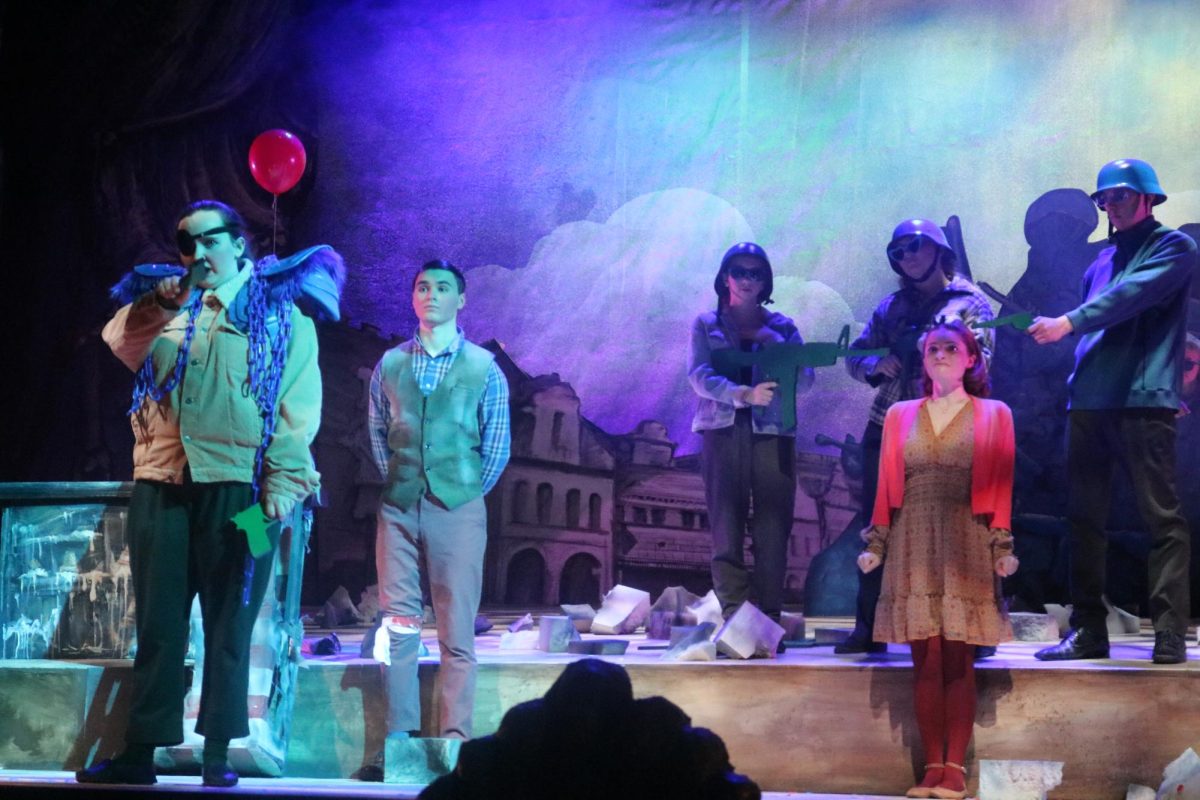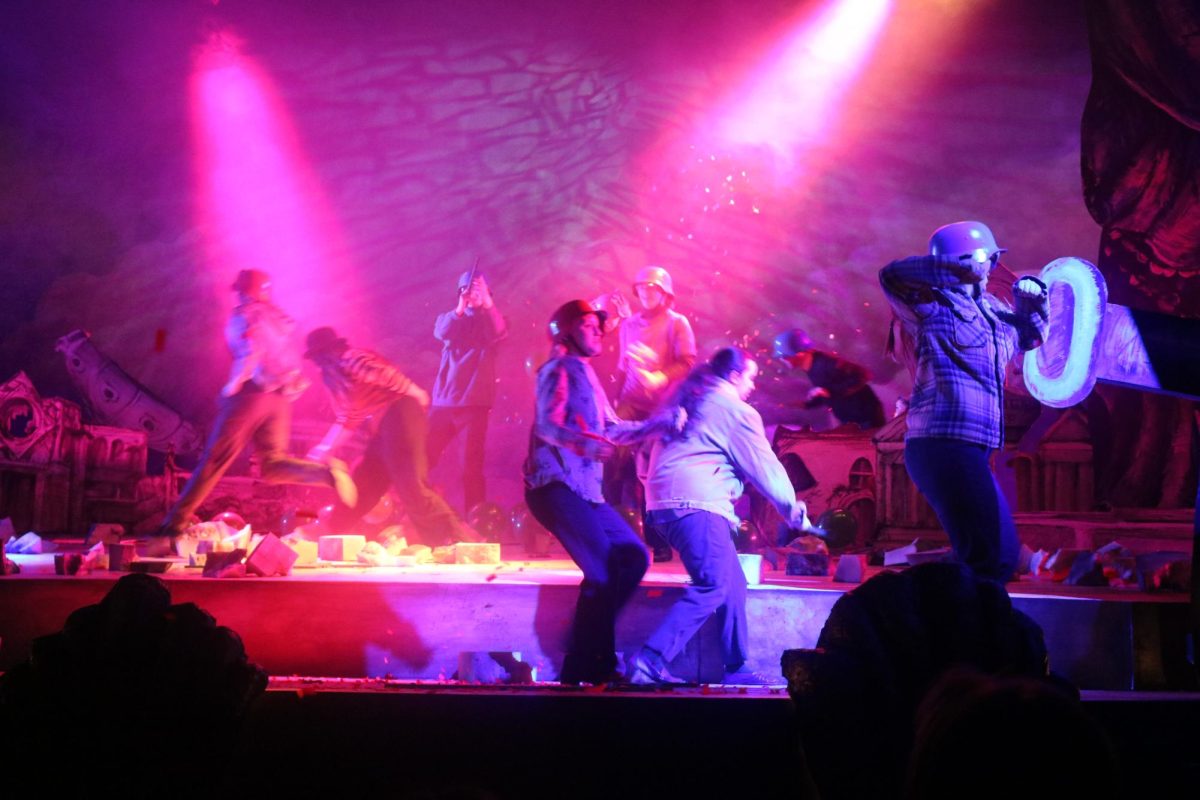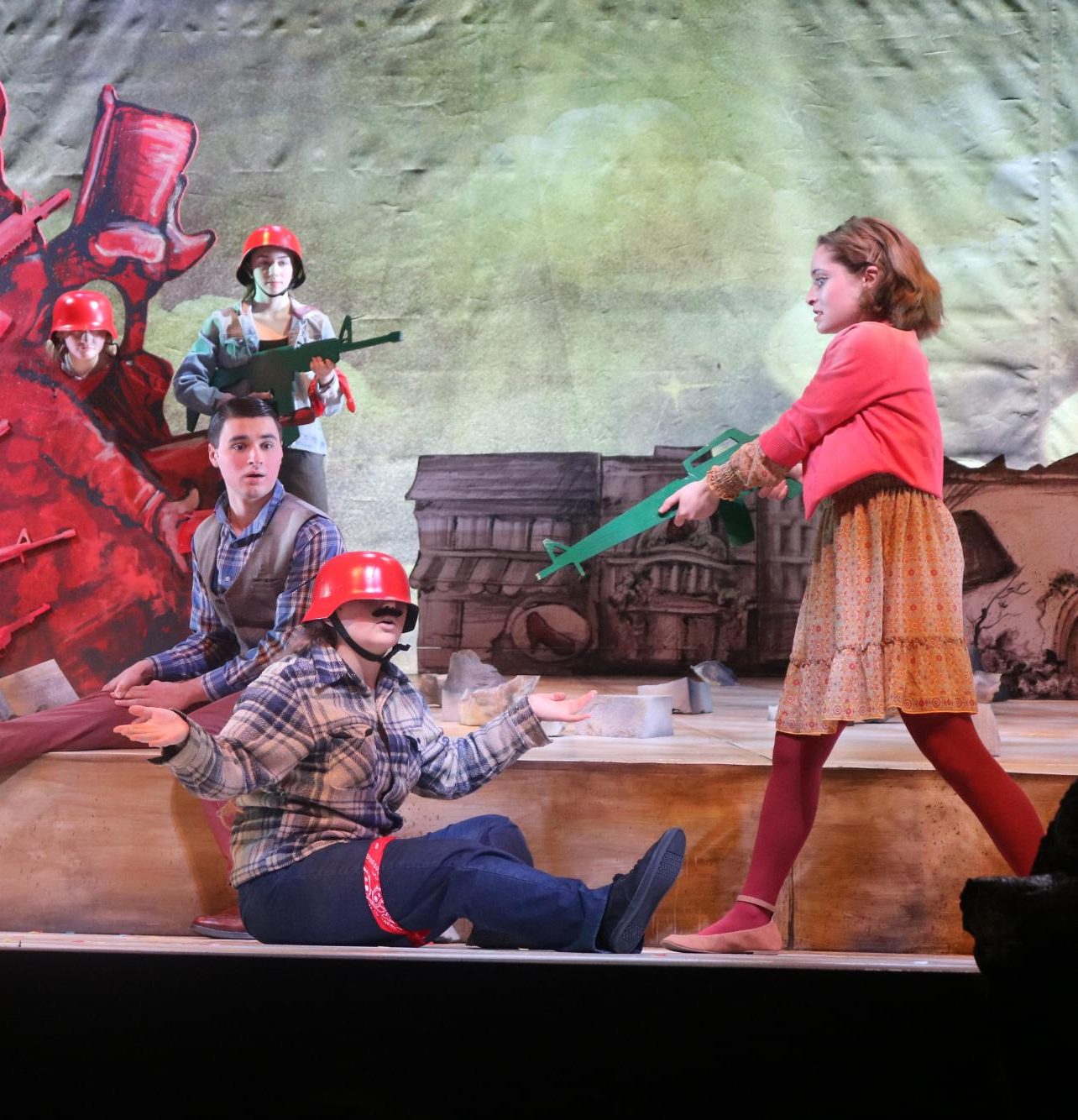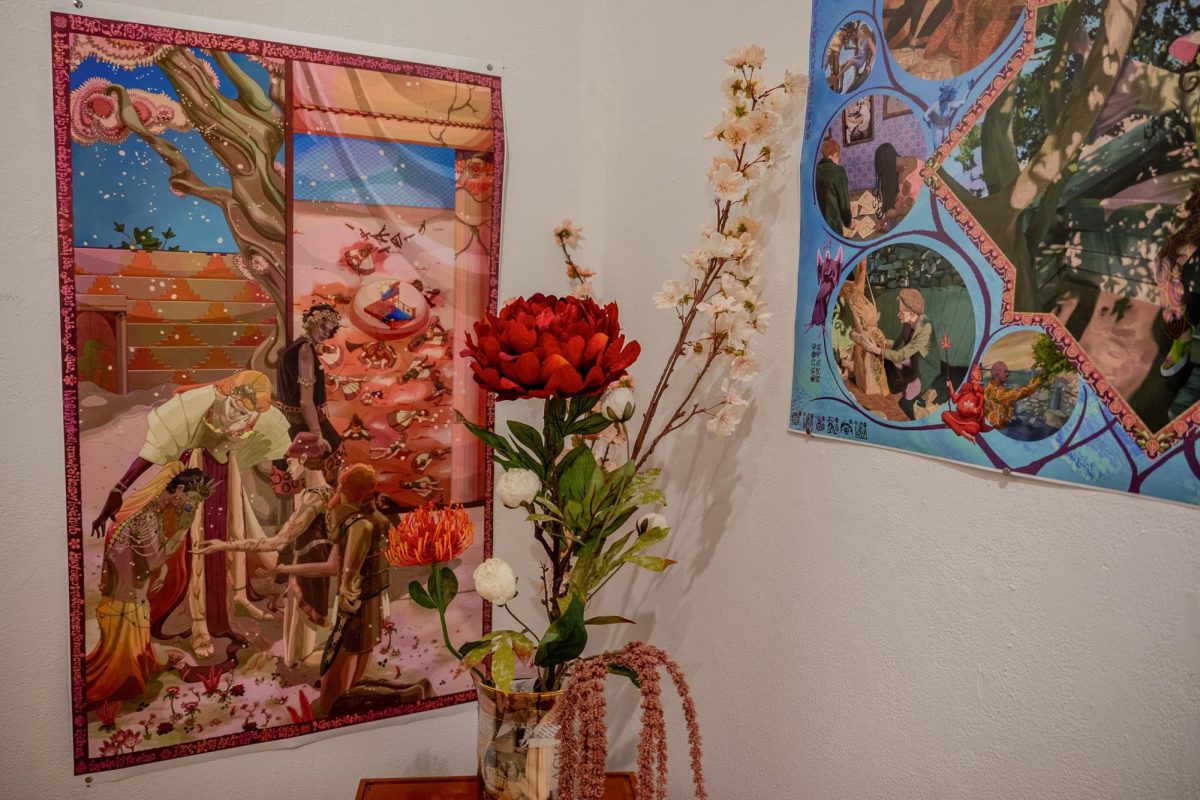In the span of just one hour, Roberts Theatre in Bucksbaum Arts Center transformed into a town of surprises, complete with an ice cream truck full of explosive flavors, giant tanks, popping balloons, sudden death, many costume changes, and a small but mighty cast.
For two weekends in November, “Pity,” directed by Dr. Karie Miller, visiting assistant professor and produced by the Department of Theatre, Dance, and Performance Studies (TDPS), hit the stage with a bang. “Pity,” created by British playwright Rory Mullarkey, is a 2017 absurdist play which mimics doom scrolling on social media compressed into an apocalyptic single day of atrocity and mass destruction.
The tagline of the play asks audience members to consider everything that is happening in the world, and if we even care.
The play opens with a character known as Person, played by Paul Reif `26, introducing the audience to his town, where he encounters a Professor, played by Ben Johnson `27, and his Daughter, played by Sophia-Levitas Goren `28, who offers him an ice-cream. Out of nowhere, a giant lightning bolt falls from the sky, striking Professor dead, leaving Daughter and Person instantly married, surrounded by looming disasters.
The script left the actors ample room to play around and discover their characters. Reif said, “Person and Daughter were so normal, almost to a fault. I felt as though I wanted to get past the audience seeing Paul, so I approached that as thinking of myself as the caretaker of the piece.” He added, “As all of the atrocities were happening behind us, we remained the same.”

Danielle Rogers `28, played bleeding actor, paramilitary, and looter. “Playing bleeding person was a character that I had to take myself out of a place of comfort, and be weirder and more creative than I was,” She said. “For me, theater is getting comfortable being uncomfortable and finding creativity in those choices.”
Throughout the play, troublemakers and puppeteers wreak havoc upon the town, disrupting dialogue with sudden bombings and explosions of buildings. War breaks out between two sides: the reds and the blues, positioned on the right and left stages, headed by Warlords with paramilitary and snipers.
The play is undeniably weird. From the President, played by Isaac Alexander `28, entering on a train singing about sandwiches to a sniper rocking out on the guitar to a band of refugees on the verge of cannibalism, actors embodied a variety of characters, all meeting unfortunate deaths as famine, bombings, shootings and pandemic broke out.
At the center of “Pity” lies the Atrocity Ballet, the choreographed battle between the reds and the blues, set to Tiny Tim’s eccentric “Livin’ in the Sunlight, Lovin’ in the Moonlight.”

Joslyn Lilly `27, who played Co-worker, Sniper, Generous Refugee, Angel, said her favorite ensemble piece was the ballet. “We went through so many phases of changing the atrocity ballet. It morphed a lot from what it started out as, but the end product was really fun, everything from working together to the popping of the balloons,” Lilly said.
One of the final moments of the play is the airplane arrival of Sal the Mailwoman, played by Sophia Dorward `28, who encounters Daughter and Person after they desperately resorted to eating a famous actor upon being the last standing people in their town of ruins.
“When Sal is talking, everyone else is supposed to be dead. All is silent except for Sal, and Sal is meant to be a moment of calm after the chaos that’s just happened, after the brutality. I really love how Sal tells you about her life and this normal day, and then suddenly it’s like, oh, your family died too,” Dorward said. “For a second, maybe things will go back to normal, but no, we have lost everything. I feel like it really hits home and makes it feel more real.”
For many cast members, “Pity” was their Grinnell TDPS Mainstage debut. The small cast size allowed them to foster a strong sense of community and put together an incredibly detailed show. “For a lot of the story, the small cast allowed for a sense of closure in the atrocities, nothing was final, and that wouldn’t be the last time you would see that actor, as they would immediately come on as something else.”
“I didn’t know this because I’m a first year, but apparently Pity is the biggest production in terms of scale and building that huge set that Grinnell has had in awhile. It’s one hell of a start.” Olyvia Liu-Cai `28, assistant stage manager, said.
Lucie Greene `23 designed the set, drawing from background knowledge she had on the play after choosing to study “Pity” during the Playwriting class she took with Miller. Greene and Miller had a clear vision for the production prior to the rehearsal process. Miller said she knew she wanted a raked stage, or a slanted stage, which allowed for a forced perspective style.
On the first day of rehearsals, Greene brought a small diorama of the set she created, complete with miniatures of many of the set elements for the cast to envision.
Liu-Cai said, “I loved how through our rehearsals, everytime we would show up, we would just see this world being built in front of us.” They said the cast particularly enjoyed the cut out of the Red Warlord, played by Sarah Reif `28, which they dubbed “Little Sarah.”
Natalie Nardone `27, stage manager, said, “What set this show apart was overall, the great group of people. Everyone was really nice and respectful and cared a lot about each other. It was a nice space to be.”
This semester, Miller taught dramaturgy to six Grinnell College students in THD 350: Theatre Methods: Dramaturgy and 14 incarcerated students enrolled in the Grinnell College Liberal Arts in Prison Program (LAPP). In these two classes, students learned about the process of advocating for the world of Pity, and they collaborated on preparing audience engagement materials for the show.
They collectively designed the program in the style of a newspaper, which included content warnings, historical background information, and classified ads for supplemental explosion insurance, a gently used military tank, beautiful tropical islands, Uncle Sam, server and mail carrier postings, and a war search.
Morgan Smith `26, a dramaturg, said, “I think the play is a reminder that we need to be conscious in our actions, especially in a world of disasters and tragedy, we have to be intentional, because otherwise we’re just going to move through life as if nothing happened, and that’s not necessarily good for anybody.”
“Pity and how well it went and how well it was received is a great example of what our department does uniquely compared to other departments at other schools. We prioritize new work and collaboration and we are interested in taking artistic risks,” said Miller.

Miller added, “Our department can be more of a performance laboratory where we can explore different kinds of contents and different ways of doing that other schools don’t do. We are not a normal department, and we are one of the few undergraduate departments that teaches performance studies as a big part of what we do.”







